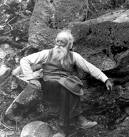John Burroughs 1837 - 1921
March 17, 2008
 John
Burroughs 1837 - 1921 the
‘Grand Old Man of Nature’ was an American
naturalist and essayist
important in the evolution of the U.S. conservation
movement.
John
Burroughs 1837 - 1921 the
‘Grand Old Man of Nature’ was an American
naturalist and essayist
important in the evolution of the U.S. conservation
movement.
Burroughs was close friend of Walt Whitman, and William Wordsworth and Ralph Waldo Emerson became lifelong influences through their focus on nature and its effect on the spirit. In 1860, Burroughs became a writer at the _Atlantic Monthly, _and so he came into contact with Elizabeth Stuart Phelps Ward, Thomas Wentworth Higginson, Thomas Bailey Aldrich, and he was in the centre of the radical intelligentsia which included Emily Dickinson, Edwin Booth, Mary Corinna Putnam Jacobi and many others.__
In 1901, Burroughs met an admirer Clara Barrus. She was a physician with the state psychiatric hospital in Middletown, N.Y. Clara was 33 and nearly half his age. She was the great love of his life and ultimately his literary executrix. She moved into his house after Ursula died in 1917.
Clara Barrus (1864-1931) was one of a small number of women who graduated from medical school in the late 19th century.
After graduation in 1888 from Boston University, she practiced in New York State (Middletown State Hospital of Homeopathy) and was also a professor of psychiatry at Women’s College, N.Y.C. Dr. Barrus was close friends with John Burroughs, the famous naturalist and nature writer.
Clara Barrus [1864-1931] was a physician and author, best known as the official biographer of John Burroughs, prominent American naturalist writer. Barrus was born in Port Byron, New York and received her medical degree [MD] from Boston University in 1888.
During her medical career she practiced privately in Utica, New York, served on the staff of the Middletown State Homeopathic Hospital for the Insane, and as professor of psychiatry at the Woman’s Medical College of New York City.
Clara Barrus met John Burroughs in 1902 and became his devoted follower, interviewer, and frequent companion.
She published several essays on Burroughs during his lifetime, and, after his death, was named his literary executrix and official biographer. She devoted most of her remaining years to Burroughs’ memory, editing his posthumous works and journals and publishing the two-volume ”Life and Letters of John Burroughs” in 1928 and ”Whitman and Burroughs, Comrades” in 1931.
The Clara Barrus Papers are held in the New York Public Library.
Burroughs consulted astrologer Evangeline Smith Adams:
Evangeline Adams once asked a famous client, naturalist John Burroughs, why he believed in astrology. His eyes turned toward the heavens.
"Why shouldn't I? Everything in the universe influences everything else, so naturally the stars must influence man."
His hostess, professing her great love of birds, bewailed their disappearance from her neighbourhood. She had not seen a bird for such a long, long time. The wicked boys and the marauding cats had driven them all away!
“Uncle John” looked sympathetic, but said nothing. Shortly afterward he put on his hat, tucked his note book and opera glasses in his pocket and went out for an hour’s walk.
On his return he invited his hostess to sit down beside him, produced his note book and showed her a list of nearly twenty different species of birds which he bad observed during his hour’s walk, within a half mile of her home!
The difference between Mr. Burroughs and his hostess was simply that he not only knew what to look for, but where and how to look for it; and so he easily found what was hidden from her eyes.